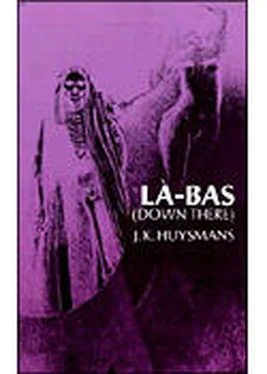Joris-Karl Huysmans - Down There (Là-Bas)
Здесь есть возможность читать онлайн «Joris-Karl Huysmans - Down There (Là-Bas)» весь текст электронной книги совершенно бесплатно (целиком полную версию без сокращений). В некоторых случаях можно слушать аудио, скачать через торрент в формате fb2 и присутствует краткое содержание. Жанр: Классическая проза, на английском языке. Описание произведения, (предисловие) а так же отзывы посетителей доступны на портале библиотеки ЛибКат.
- Название:Down There (Là-Bas)
- Автор:
- Жанр:
- Год:неизвестен
- ISBN:нет данных
- Рейтинг книги:3 / 5. Голосов: 1
-
Избранное:Добавить в избранное
- Отзывы:
-
Ваша оценка:
- 60
- 1
- 2
- 3
- 4
- 5
Down There (Là-Bas): краткое содержание, описание и аннотация
Предлагаем к чтению аннотацию, описание, краткое содержание или предисловие (зависит от того, что написал сам автор книги «Down There (Là-Bas)»). Если вы не нашли необходимую информацию о книге — напишите в комментариях, мы постараемся отыскать её.
Down There (Là-Bas) — читать онлайн бесплатно полную книгу (весь текст) целиком
Ниже представлен текст книги, разбитый по страницам. Система сохранения места последней прочитанной страницы, позволяет с удобством читать онлайн бесплатно книгу «Down There (Là-Bas)», без необходимости каждый раз заново искать на чём Вы остановились. Поставьте закладку, и сможете в любой момент перейти на страницу, на которой закончили чтение.
Интервал:
Закладка:
"And to think that these researches are being carried on at the present time! Only, most of the hermetics now deny medical and divine virtues to the famous stone. They think simply that the grand magisterium is a ferment, which, thrown into metals in fusion, produces a molecular transformation similar to that which organic matter undergoes when fermented with the aid of a leaven.
"Des Hermies, who is well acquainted with the underworld of science, maintains that more than forty alchemic furnaces are now alight in France, and that in Hanover and Bavaria the adepts are more numerous yet.
"Have they rediscovered the incomparable secret of antiquity? In spite of certain affirmations, it is hardly probable. Nobody need manufacture artificially a metal whose origins are so unaccountable that a deposit is likely to be found anywhere. For instance, in a law suit which took place at Paris in the month of November, 1886, between M. Popp, constructor of pneumatic city clocks, and financiers who had been backing him, certain engineers and chemists of the School of Mines declared that gold could be extracted from common silex, so that the very walls sheltering us might be placers, and the mansards might be loaded with nuggets!
"At any rate," he continued, smiling, "these sciences are not propitious."
He was thinking of an old man who had installed an alchemic laboratory on the fifth floor of a house in the rue Saint Jacques. This man, named Auguste Redoutez, went every afternoon to the Bibliothèque Nationale and pored over the works of Nicolas Flamel. Morning and evening he pursued the quest of the "great work" in front of his furnace.
The 16th of March the year before, he came out of the Bibliothèque with a man who had been sitting at the same table with him, and as they walked along together Redoutez declared that he was finally in possession of the famous secret. Arriving in his laboratory, he threw pieces of iron into a retort, made a projection, and obtained crystals the colour of blood. The other examined the salts and made a flippant remark. The alchemist, furious, threw himself upon him, struck him with a hammer, and had to be overpowered and carried in a strait-jacket to Saint Anne, pending investigation.
"In the sixteenth century, in Luxemburg, initiates were roasted in iron cages. The following century, in Germany, they were clothed in rags and hanged on gilded gibbets. Now that they are tolerated and left in peace they go mad. Decidedly, fate is against them," Durtal concluded.
He rose and went to answer a ring at the door. He came back with a letter which the concierge had brought. He opened it.
"Why, what is this?" he exclaimed. His astonishment grew as he read:
"Monsieur,
"I am neither an adventuress nor a seeker of adventures, nor am I a society woman grown weary of drawing-room conversation. Even less am I moved by the vulgar curiosity to find out whether an author is the same in the flesh as he is in his books. Indeed I am none of the things which you may think I am, from my writing to you this way. The fact is that I have just finished reading your last book,"
"She has taken her time," murmured Durtal, "it appeared a year ago."
"melancholy as an imprisoned soul vainly beating its wings against the bars of its cage."
"Oh, hell! What a compliment. Anyway, it rings false, like all of them."
"And now, Monsieur, though I am convinced that it is always folly and madness to try to realize a desire, will you permit that a sister in lassitude meet you some evening in a place which you shall designate, after which we shall return, each of us, into our own interior, the interior of persons destined to fall because they are out of line with their 'fellows'? Adieu, Monsieur, be assured that I consider you a somebody in a century of nobodies.
"Not knowing whether this note will elicit a reply, I abstain from making myself known. This evening a maid will call upon your concierge and ask him if there is a letter for Mme. Maubel."
"Hmm!" said Durtal, folding up the letter. "I know her. She must be one of these withered dames who are always trying to cash outlawed kiss-tickets and soul-warrants in the lottery of love. Forty-five years old at least. Her clientele is composed of boys, who are always satisfied if they don't have to pay, and men of letters, who are yet more easily satisfied-for the ugliness of authors' mistresses is proverbial. Unless this is simply a practical joke. But who would be playing one on me-I don't know anybody-and why?"
In any case, he would simply not reply.
But in spite of himself he reopened the letter.
"Well now, what do I risk? If this woman wants to sell me an over-ripe heart, there is nothing forcing me to purchase it. I don't commit myself to anything by going to an assignation. But where shall I meet her? Here? No! Once she gets into my apartment complications arise, for it is much more difficult to throw a woman out of your house than simply to walk off and leave her at a street corner. Suppose I designated the corner of the rue de Sèvres and the rue de la Chaise, under the wall of the Abbaye-au-Bois. It is solitary, and then, too, it is only a minute's walk from here. Or no, I will begin vaguely, naming no meeting-place at all. I shall solve that problem later, when I get her reply."
He wrote a letter in which he spoke of his own spiritual lassitude and declared that no good could come of an interview, for he no longer sought happiness on earth.
"I will add that I am in poor health. That is always a good one, and it excuses a man from 'being a man' if necessary," he said to himself, rolling a cigarette.
"Well, that's done, and she won't get much encouragement out of it. Oh, wait. I omitted something. To keep from giving her a hold on me I shall do well to let her know that a serious and sustained liaison with me is impossible 'for family reasons.' And that's enough for one time."
He folded the letter and scrawled the address.
Then he held the sealed envelope in his hand and reflected.
"Of course I am a fool to answer her. Who knows what situations a thing like this is going to lead to? I am well aware that whoever she be, a woman is an incubator of sorrow and annoyance. If she is good she is probably stupid, or perhaps she is an invalid, or perhaps she is so disastrously fecund that she gets pregnant if you look at her. If she is bad, one may expect to be dragged through every disgusting kind of degradation. Oh, whatever you do, you're in for it."
He regurgitated the memories of his youthful amours. Deception. Disenchantment. How pitilessly base a woman is while she is young!
"… To be thinking of things like that now at my age! As if I had any need of a woman now!"
But in spite of all, his pseudonymous correspondent interested him.
"Who knows? Perhaps she is good-looking, or at least not very ill-looking. It doesn't cost me anything to find out."
He re-read her letter. No misspelling. The handwriting not commercial. Her ideas about his book were mediocre enough, but who would expect her to be a critic? "Discreet scent of heliotrope," he added, sniffing the envelope.
"Oh, well, let's have our little fling."
And as he went out to get some breakfast he left his reply with the concierge.
CHAPTER VII
"If this continues I shall lose my mind," murmured Durtal as he sat in front of his table reperusing the letters which he had been receiving from that woman for the last week. She was an indefatigable letter-writer, and since she had begun her advances he had not had time to answer one letter before another arrived.
"My!" he said, "let's try and see just where we do stand. After that ungracious answer to her first note she immediately sends me this:
"'Monsieur,
"'This is a farewell. If I were weak enough to write you any more letters they would become as tedious as the life I lead. Anyway, have I not had the best part of you, in that hesitant letter of yours which shook me out of my lethargy for an instant? Like yourself, monsieur, I know, alas! that nothing happens, and that our only certain joys are those we dream of. So, in spite of my feverish desire to know you, I fear that you were right in saying that a meeting would be for both of us the source of regrets to which we ought not voluntarily expose ourselves…'
Читать дальшеИнтервал:
Закладка:
Похожие книги на «Down There (Là-Bas)»
Представляем Вашему вниманию похожие книги на «Down There (Là-Bas)» списком для выбора. Мы отобрали схожую по названию и смыслу литературу в надежде предоставить читателям больше вариантов отыскать новые, интересные, ещё непрочитанные произведения.
Обсуждение, отзывы о книге «Down There (Là-Bas)» и просто собственные мнения читателей. Оставьте ваши комментарии, напишите, что Вы думаете о произведении, его смысле или главных героях. Укажите что конкретно понравилось, а что нет, и почему Вы так считаете.












